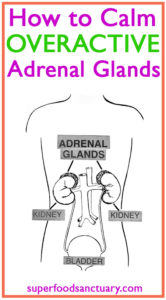
I cover histamine intolerance in depth on this episode of the Dr. While sweating is of course part of exercise, if you find yourself excessively sweaty when you try to cool down, your face flushed and your heart rate unable to come down, or with blotchy, red and possibly itchy skin, then you may be dealing with histamine intolerance.

What About Excess Sweating During Or After Exercise? We see this with HPA Axis Dysfunction (the communication between your brain and adrenal glands) or hypoglycemia (low blood sugar). This can also show up as what feels like sweating for no reason or even at rest when you are running low cortisol and a seemingly benign stress like low blood sugar can cause a burst of adrenaline to keep you going. This can happen in an obvious situation of stress, like nearly getting smacked by a NYC cab, having an argument, hearing distressing news, exercise, or anything else that jolts you into stress. This can happen transiently with Hashimoto’s ( keep scrolling down to find out more in a bit) or more consistently with hormone secreting nodules or Grave’s disease (also autoimmune, like Hashi) for example.īut more commonly it can be in response to adrenaline, your short term, high octane stress hormone. For example, hyperthryoidism (elevated thyroid hormones) can certainly crank up your temp and leave you sweaty. What we’re talking about here is considered primary and is often due to hormonal shifts.

The secondary type is excess sweating all over the body and typically due to a medical condition (such as Fabry’s disease or certain inherited metabolic disorders) or overmedication of certain prescription meds.Primary hyperhidrosis is excessive sweating in the hands, underarms, face, and feet without any apparent reason.There are two types of too much sweat: primary and secondary. Here’s what’s up with weird sweating: Excess Sweating Many hormonal fluctuations and issues can create some odd sweats – or lack of it.

What makes you sweat at odd times or not at all? Their sweat is greasier and because of it’s fatty acid content (which bacteria on your skin metabolize) it accounts for smellier sweat.īoth types of sweat are essentially odorless, but apocrine sweat once it’s worked on by your skin’s bacteria, will then get smelly.

They are more continuous secreters of a fattier type sweat into the gland tubule of each hair follicle, vs.


 0 kommentar(er)
0 kommentar(er)
